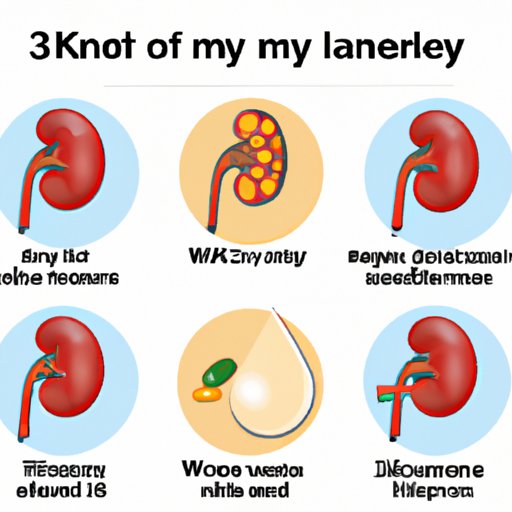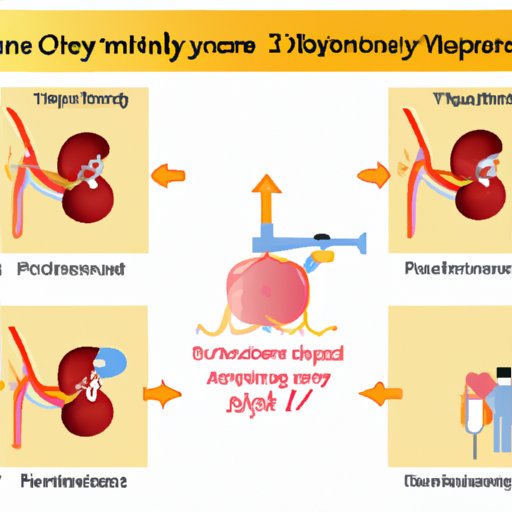
I. Introduction
Kidney disease is a widespread condition that affects millions of people worldwide. According to the National Kidney Foundation, around 37 million Americans have some form of kidney disease. Kidney disease occurs when the kidneys are unable to filter waste products from the body. There are different stages of kidney disease, and stage 3 is a crucial turning point. In this article, we provide a comprehensive guide on understanding and managing stage 3 kidney disease.
II. Understanding the Progression of Kidney Disease: A Guide to Stage 3
Kidney disease has five stages, with stage 1 being the mildest and stage 5 being the most severe. Stage 3 kidney disease is where the kidneys’ function is moderately reduced, and they are unable to remove waste and excess fluids efficiently from the body. At this stage, you may experience symptoms such as fatigue, swelling in your ankles, and more frequent urination.
Factors such as high blood pressure, age, diabetes, and family history may contribute to the progression of your kidney disease from stage 2 to stage 3.
III. Navigating Stage 3 Kidney Disease: What You Need to Know
Working with a healthcare team is essential when managing stage 3 kidney disease. Your healthcare team may include a nephrologist, a registered dietitian, and a social worker. They will work together to make a tailored plan for managing your condition.
Getting diagnostic tests regularly is another critical aspect of managing kidney disease. Your healthcare provider may recommend blood and urine tests to monitor your kidney function and check for any potential complications.
IV. The Impact of Stage 3 Kidney Disease on Your Health
Kidney disease can worsen over time, leading to long-term complications such as high blood pressure, weak bones, anemia, and nerve damage. Additionally, when your kidneys are damaged, they cannot filter excess fluid from your body efficiently, leading to fluid build-up around your heart or lungs, which can cause heart or lung problems.
V. Managing Stage 3 Kidney Disease: Lifestyle Changes and Treatment Options
Several lifestyle changes can improve your kidney function, such as adjusting your diet, exercising, managing your blood sugar levels, and controlling your blood pressure. A registered dietitian can help create a kidney-friendly diet plan that limits protein, sodium, and phosphorus intake.
Medications such as ACE inhibitors or angiotensin receptor blockers may reduce blood pressure and protect your kidneys from further damage. Your healthcare provider may also prescribe erythropoietin supplements to manage anemia.
VI. Breaking Down the Symptoms and Complications of Stage 3 Kidney Disease
Common symptoms of stage 3 kidney disease include fatigue, anemia, swelling in the ankles or feet, and frequent urination. Complications of stage 3 kidney disease include nerve damage, high blood pressure, weak bones, and cardiovascular disease. Your healthcare provider may recommend specific treatments or medications to manage each complication.

VII. Preventing Complications: Early Detection and Treatment of Stage 3 Kidney Disease
Early detection and intervention play a crucial role in preventing complications and slowing the progression of kidney disease. Regular blood and urine tests can detect kidney damage early on, allowing healthcare providers to intervene and manage the condition adequately.
VIII. Life with Stage 3 Kidney Disease: Coping Strategies and Support Resources
Coping with a chronic illness can be difficult, both physically and mentally. It is essential to take care of your mental health by seeking support from family and friends. Support groups and online forums can provide a space to connect with others who are also living with kidney disease.
IX. Conclusion
Managing stage 3 kidney disease requires a holistic approach that involves lifestyle changes, regular medical check-ups, and a supportive healthcare team. Understanding the progression of your condition and the potential complications that may arise is crucial when managing your health. By taking an active role in managing your condition and seeking support when needed, you can live a fulfilling life with kidney disease.




